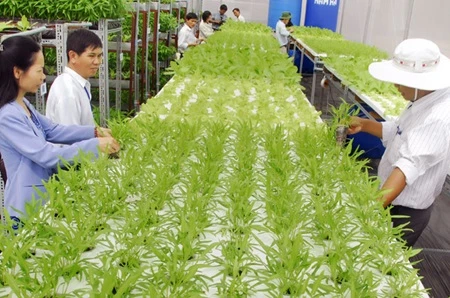Hanoi (VNA) - More than 50 local Forest Protection Department staff, forestry officers and village heads in districts in the northern province of Bac Kan have received training in Asset-Based Community Development (ABCD), which will lead to sustainable harvesting of medicinal and aromatic plants.
The two four-day training sessions improved the implementation of community development projects in nine local communes in the districts of Ngan Son, Na Ri, Cho Don and Ba Be. The projects focus on the sustainable harvesting of wild medicinal and aromatic plants (MAPs).
Vietnamese conservation NGO GreenViet conducted the training sessions, which were attended by local officers and village heads.
They now know how to apply ABCD, an innovative development strategy focusing on identifying and mobilising community assets at their local project sites.
The ABCD strategy will allow community members to take advantage of new economic opportunities without being dependent on outside organisations.
The beneficiary communities are part of a project that was begun in 2011 by TRAFFIC and the Bac Kan Forest Protection Department (FPD) to improve livelihoods and conserve biodiversity by using sustainable wild plant harvesting techniques.
The project, initially funded by the Critical Ecosystems Partnership Fund (CEPF), and further by the Keidanren Nature Conservation Fund (KNCF), has provided training, tools and connections for local collectors.
This has helped them harvest medicinal plants sustainably, ensuring a premium-paying market for their goods.
One of the project's goals is for sustainably-sourced, wild-collected and semi-processed products to be the first in Vietnam to meet FairWild certification.
This is an internationally-recognised standard for legal and sustainable sourcing and benefit sharing from wild plant resources.
The two training sessions mark the start of a new phase of the TRAFFIC and Bac Kan FPD project, launched at the beginning of October this year and funded by the Darwin Initiative.
Continuing to build on the work started in 2011, the first objective of this three-year project was to enhance the collecting cooperatives' capacity at the project sites.
The interactive training provided opportunities for the participants to uncover and understand the strengths and assets already existing in their communities.
Local assets, categorised as individuals, associations, institutions, and physical, financial and cultural assets and connections, were reviewed and analysed in relation to MAPs conservation and livelihood development efforts.
"What's new and exciting about ABCD is that the participants begin to use what is already in the community. It's the combination of these assets, regional development trends and community expectations and goals that creates new development opportunities," Nguyen Thi Mai, Programme Officer for TRAFFIC in Vietnam, said.
Using connections and opportunities created by the ABCD model, local collectors will be able to build collecting co-operatives, mobilise their own assets to practise sustainable harvesting techniques, and improve their processing skills.
They will also be able to improve their market access by building stronger relationships with pharmaceutical and cosmetic companies.
This month, the Bac Kan FPD and TRAFFIC will begin applying the ABCD methodology through on-the-ground activities in project sites, where it will allow more effective and efficient project implementation over the next two and a half years of the project.-VNA





















